We run our website the way we wished the whole internet worked: we provide high quality original content with no ads. We are funded solely by your direct support. Please consider supporting this project.
Podcast: Was THIS World the Most Likely World and Wouldn’t God Have Anticipated It?
Greg considers what God might have risked and might have expected for this world.

Send Questions To:
Dan: @thatdankent
Email: askgregboyd@gmail.com
Twitter: @reKnewOrg
Greg’s new book: Inspired Imperfection
Dan’s new book: Confident Humility
Subscribe:
Category: ReKnew Podcast
Tags: Divine Foreknowledge, Foreknowledge, Open Theism
Related Reading

What is the significance of Judges 2:20–3:5?
The Lord did not provide any assistance in Israel’s battles, “In order to test Israel, whether or not they would take care to walk in the way of the Lord as their ancestors did” (vs. 22). The pagan opponents of Israel “were for the testing of Israel, to know whether Israel would obey the commandments…

What is the significance of Deuteronomy 9:13–14, 18–20, 25?
The Lord tells Moses “Let me alone that I may destroy them [the Israelites] and blot out their name from under heaven…” (vs. 14). Moses later says to the Israelites, “the Lord intended to destroy you” (vs. 25). Moses interceded for forty days and then tells the Israelites, “the Lord listened to me…” (vs. 19).…

Did God Predestine Judas to Betray Jesus? (podcast)
Greg talks about the role Judas played in the crucifixion of Jesus and speculates about his potential for good. Episode 516 http://traffic.libsyn.com/askgregboyd/Episode_0516.mp3

How do you respond to Genesis 3:15?
The Lord promises that he will “put enmity between you [the serpent] and the woman, and between your offspring and hers; he will strike your head, and you will strike his heel.” This is commonly considered the first messianic prophecy of the Bible. What a glorious and gracious picture of God we are given here!…

Lord Willing? Part 1
Greg sat down with Jessica Kelley recently to talk with her about her book Lord Willing?. We’re posting their conversation in three parts. Today, in part 1, Jessica shares the story of when her son Henry was diagnosed with an aggressive brain tumor at age 4. You can find part 2 of the interview here, and part…




